#also notably claire is a bastion of goodness
Note
What's your opinion on Karen Page? AJAKSKKSKS
I have some random half formed opinions on Karen, and the Daredevil narrative for her in general. And maybe how the defenders writing didn’t really mesh with how she’d been portrayed before, and if it did, then it showed her in a vaguely hypocritical light.
Also, she’s a legit straight up murderer and it’s kind of vaguely hilarious in an ironic way that she now works for a living digging up other peoples dirt, because she honestly wants to see justice done. She’s not somebody who wakes up in the morning thinking something malevolent, she’s by all accounts, somebody who has aspirations of goodness. Her moral grayness her so much more interesting in that light, tbh.
(but, like, honestly, I neither like nor dislike Karen, she doesn’t particularly grab me but i don’t you know, hate her or anything, i’m just personally not captivated).
Anyway, I’ve been listening to a podcast lately hosted by 2 bona fide behavioural analysts (jim clemente and Laura Richards) and honestly, hearing them talk about it, while simultaneously watching S2 of Daredevil, was thought provoking.
We know that Karen murdered a man, afterwards she was traumatized by his actions (the kidnapping and threats against her) and that she was even more traumatized by her own actions, she just gunned him down, The End. The show could have painted this in a number of ways, but imo it clearly painted this as a murder, to be honest. I mean, he was victimising her at the time, but this shock killing was not narratively described as a valiant bid for freedom where a woman shoots herself out of a hostage situation. It’s painted as Karen shooting him, and her being left alone in a room with a gun and a blood soaked body.
She’s terrified she’d get found out. I haven’t seen that season for a long time now, but also, i think it’s relevant that a chunk of her fear after this was fear about what Fisk would do if he found out she did it, and for her own safety thereafter, rather than the action of killing a man.
In that light, fashforward to season 2 and the intro of Frank Castle. Karen is the character in the entire show who is the most okay with Frank. She sees Frank’s honour code and understands it, she isn’t afraid of him harming her despite him being genuinely terrifying. She also isn’t nearly as bothered by his methodology as the others. Frank believes killing the wrongdoers is the apt solution to Hell’s Kitchen’s problems (and anywhere, really).
It’s interesting, because, throughout the whole time Nelson and murdock are defending Castle, she is trying to convince Matt and Foggy of the merits to his actions. She’s trying to justify it. This is why I mentioned the podcast, because in it, they explain that people who have thoughts and feelings that are generally considered by society to be abhorrent or wrong (and i mean, actual fucked up things, not shitty bigotry) they will attempt to find the same behaviour in others they trust and respect, to prove to themselves that they’re not Bad™.
Karen, with both Foggy and Matt, the two she is closest to in Hell’s Kitchen (in the world really), BOTH get this line of questioning from her, where she tries to get them to admit that hey! maybe killing bad people is okay and fine. This, to me, seems that Karen is looking for some kind of absolution. Not the kind where she denounces what she did, or what Frank did, but the kind where others prove her ‘correct’ and absolve her of her sins by justifying them. The kind where she doesn’t have to feel bad or be in trouble for her actions.
In the end, Matt and Foggy, having no clue all the while that this is personal to her, brush off every justification she gives, both of them basically going ‘what the hell! no! bad!’. Because while matt is a vigilante, he’s also one who does not approve of being judge jury and executioner. Foggy was even less likely than Matt to play part to that line of thinking, because he thinks Matt goes too far, let alone Castle. Them doing this, rejecting her without even knowing it, leads Karen smack into the figurative arms of Frank Castli, who is obviously intimidating to her, and goes too far in her eyes, and freaks her out, but he’s the one she’s most in tune with. Her philosophy is far closer to his than it is to Matt and Foggy. Frank even says it himself, he knows she’d have taken the shot, she means business, even if it’s lethal.
I have no idea what to say about Karen and Matt. Narratively it’s never made sense to me, and i honestly thought that her reaction in the defenders to him needed a hell of a lot of background filling out between daredevil s2 & this show to make sense. It needed background we weren’t given, but Karen’s /always/ been pro daredevil, we needed a filler to tell us what happened in that gap of time to cause her to treat matt’s vigilantism as an addiction. Foggy, Foggy it made perfect sense because there was background, with Karen who had always been pro devil, it needed explaining. As it is, it kind of came across as Karen being pro vigilante as long as it’s not her friend, which is kind of harsh? It can ruin somebody else’s life but not somebody who i like? Which they could have done, but i’ve also never really thought of karen as selfish in that type of sense, either.
But, honestly, i feel like the main facet of Karen’s character, her absolute defining trait, is curiosity.
Karen’s curiosity knows no bounds, and i mean that. No bounds. Karen got into trouble in the first place in episode one because she saw something and didn’t let it go (she continues to not let it go the whole season, even when she’s warned, even when it’s dangerous, through everything). It’s interesting, because Karen’s curiosity doesn’t appear to have much more ground than wanting to know things, she’s a Ravenclaw type, you know? Her curiosity isn’t really tied to morality, or special interest, he is just curious.
Unfortunately, her curiosity isn’t necessarily tempered by a hell of a lot of forethought. She drags Ben to a nursing home because she dug something up, and when i say drag, i mean lies and tricks!!! Ben there with her, being pretty damn underhand tbh, i mean, it was low. And then Ben’s name ends up in the log book and then because of that, Ben is murdered.
That was an example of Karen being driven by her curiosity, bullheaded, and not thinking it though. In S2, the person she gets in trouble at the end of the season is herself. She does it again. Curiosity with no heed to consequence. She is merely lucky Frank saved her.
I mean, narratively, Karen ending up a reporter is perfect for her as a person, i’m not surprised we ended up there. She is bullheadedly curious, she is tough as nails (hello that kidnapping by the hand), and will legit do any dangerous thing to get her story. She also is curious for curiosity’s sake, so her boss doesn’t really run the risk of her only researching one thing or causing a moral shitstorm.
I’ve never really seen the show as portraying Karen as a moral goodness or whatever cliches come with the blonde noncombatant tropes in these types of stories, to me, Karen’s never really been the goodness personified in the show. To me, that is Foggy. I like it, to be honest, because lets be real, the blonde haired blue eyed ~angelic looking woman, not being the epitome of goodness???
I wouldn’t call Karen moral, i would call Karen curious, with aspirations of goodness. She wants to be a good person, but she’s thoughtless and chaotic and sometimes just kind of… amoral. No other real way to put it. I’ve also never really seen the show as portraying her as the goodness centre, i mean, i can see how the other characters would think it about her, but the audience? We know more about her than them.
Foggy and Matt don’t know she killed somebody. Her boss doesn’t know that. The stuff with Ben? that’s for us to know, too. We’re the keepers of Karen’s secrets, not the other characters. As such, the way they treat her as special and good in the show doesn’t bug me too much, from their pov, it probably looks that way, it’d annoy me if she got a good job and the show tried to tell me it’s because she’s a ~good~ person and deserved it, but imo, the show has not done that.
Her ~aspirations of goodness are all the more interesting, imo, because she does not appear to have them as some kind of attempt at penance. That would make it redemption, or an attempt at it. She’s not trying to redeem herself.
tldr, , i think Karen is curious, chaotic, wants so hard to be good, but finds herself coming up short and is scared of it. I also think the only person in the universe who accurately has her number is Frank. And also, that even if Matt’s vigilantism hadn’t destroyed their personal relationship, that in the end, the total polar opposite creeds they both have would have done the same thing in the end.
#defenders spoilers#idk how to tag this lol#reids-curls#idek if u meant to send me this but it was fun t b h#i like talking about other things#i do have karen opinions#i just don't really like her as a person much?? but yes as a character#anyway#karen page#for my own tagging#also notably claire is a bastion of goodness#but her goodness like... overpowers her shady#with karen it's the other way
104 notes
·
View notes
Video
youtube
HARRY STYLES - LIGHTS UP
[5.33]
If Harry puts his Lights Up, maybe he can change the world?
Kayla Beardslee: When I say, What the hell is this structure?, I mean it in both a complimentary and a confused way. On one hand, it's nice that Styles is experimenting beyond the traditional pop song structure, but on the other, "Lights Up" ends after a single chorus, barely even establishing itself as worthy of attention. Maybe it'll sound better in the context of the album (an argument I'm not particularly fond of), but releasing a slightly muddled, interlude-like creation as a lead single is a risky move. The production is fine (glad to see Jeff Bhasker get a new production credit), but my real quibble is with the lyrics, which are, frankly, a mess. Maybe they're trying to say something personal, but there are absolutely no specific images here, only meaningless abstractions. "What do you mean?," "I'm sorry by the way," "Can't you see?": we never learn what these lines are actually referencing, what conversation or larger topic they're responding to. Styles just throws them out like they're important -- he's singing these lines, so they must be, right? -- but never bothers to elaborate. And let's talk about the central light/dark conceit. The prechorus says, "All the lights couldn't put out the dark / Running through my heart," so the idea is that there's a darkness inside Styles that isn't affected by the light. But the chorus switches to him stepping into the light, shining, and saying "I'm not ever going back," so I guess the dark has been put out and that first part was an irrelevant lie and oh my god what's even the point of all this hype if the music can't communicate anything of substance.
[3]
Isabel Cole: Remember how Leonard DiCaprio used to be like, I mean, yes, super pretty, but also a gifted young actor with an unteachable movie star charisma and a wonderful sincerity that brought real feeling even to schlock like Titanic, only it was not enough for him to be rich and beautiful and famous and actually, in fact, extremely good at his craft, he decided he needed to be, like,serious, he needed to earn the respect of the joyless mediocrity-lovers of the Academy, he had to prove himself as An Artist as defined by perhaps the least imaginative deliberative body in the performing arts, and now he hasn't given a good performance since 2002 because no matter how committed his choices and no matter how thoughtful his physicality, he is incapable of convincing because you can always see the thinking behind the acting, you can't ever believe he is anyone other than a man desperately committed to embodying his own self-seriousness which is leaking off him so potently you wonder if his castmates can smell it on set? Anyway, "All the lights couldn't put out the dark running through my heart" is a pretty great line, so it's too bad that this song sucks.
[3]
Alfred Soto: A hashtag in search of a song, a yearning in search of an object, messianic in a godless world, strummy without sincerity, "Lights Up" incarnates 2019. But I light a candle for another "Fireproof" and "No Control."
[4]
Alex Clifton: Harry certainly isn't afraid to take risks. He's got a bit of an oddball swing to his singles--making his solo debut track about childbirth was a creative move. "Lights Out" sounds like nothing on the radio currently which is pretty awesome; I love the tonal shift in the chorus that's reminiscent of Michael Jackson's "Rock With You" in particular as that is a rare move in pop music. I would love to see Harry go full on avant-garde on this album with hints of Elton and Bowie and judging by this single, he is on his way there.
[7]
Wayne Weizhen Zhang: For all of the think-pieces that "Lights Up" is getting for its sultry music video and Harry Styles's statements (or lack thereof) regarding his sexuality, it's easy to forget what this song even sounds like: it's a slice of gourmet vanilla cake, light and airy, rich in texture, basic but tasty. Lyrically, it's effective if unambitious, perfectly what Harry described in own words, "It's all about having sex and feeling sad."
[7]
Katherine St Asaph: All the fancy production styles Styles pulls out of his voluminous costumes -- the "Rock With You" chords in the chorus, the gospel-ish backing vocals, the pummeling percussion breaks -- and all the glomming-on by Rolling Stone can't disguise the fact that this is a slightly gussied-up Shawn Mendes or OneRepublic song. Between this and the Niall song, One Direction's alumni seem to have a taste for the blandest of the band's old meat-and-potatoes rock influences.
[4]
Claire Biddles: No fan of Harry Styles was surprised when, instead of trailing the imminent sort-of-surprise release of his new single on social media, he popped up in the replies of a fan on Twitter, telling her to spend her money on therapy instead of tickets to his next tour. "I'll wait for you," he promised. Like therapy, Harry Styles exists to reflect our selves back at us; a reassuring presence that can be whoever we need him to be. "Lights Up" is a good song, but that matters less than the comfort and affirmation of the open question at its heart. "Do you know who you are?" Harry asks us -- as always centring our needs, giving us space, listening rather than waiting to speak. The best pop stars, the best crushes, aid our self-actualisation. Harry Styles is the perfect pop star, the perfect crush, because he understands this dynamic better than anyone else -- an uncomplicated delivery system for our multitudinous desires and selves.
[7]
Stephen Eisermann: What a breathtaking declaration this is. The chaotic production are wrapped perfectly by Harry's warm vocals, and it all builds to that wonderful climax of a bridge where we meet Harry. He introduces us on his terms, using this song's video and the release date (yes, releasing on National Coming Out Day is quite the stunt) to really drive home the message, but man if this doesn't feel like some kind of big event. There are so many arguments that coming out shouldn't be an event, but man if this isn't an argument that it should be.
[8]
Elisabeth Sanders: Rock and roll is no longer the counterculture, and hasn't been for decades. Most of us know this, I think--that a genre that was scandalous catharsis more than half a century ago is now a bastion of old-school respectability cloaked in nothing but the thin aesthetics of its long-gone indecorousness. And so, in a way, it's the perfect thing to turn to if you're, say, a former boy-band pop idol trying to shrug off the casual disdain that a certain kind of modern pop evokes. If you want patriarchal legitimacy, sour cream and onion flavor, but you never want to have to admit it.This is not to take some ultracontrarian edgelord view that the only truly authentic thing is commercially-viable stadium pop, because at least it's honest, but to say merely this: everybody's trying to signify something, no matter what. Even the painfully earnest.Which brings us past the folk-rock village of Harry's 2017 self-titled debut, around-about the gorgeously flamboyant suits and the Met Ball hosting gig, through the Rolling Stone interviews and carefully-minimal social media presence, to Lights Up. And it's... fine. It's certainly not a bad song, but it is one that I forgot the tune of immediately after hearing. Frankly, I still can't remember it even now, and I listened to it for the dozenth time a few seconds ago. It's just pop enough to be pop, just ponderous enough to not really be THAT kind of pop. It's got some fun spangly bits. It's probably got a lot of noises made by real instruments in it. And, most notably, it's got a fantastic, evocative, gay as hell video, which almost successfully conceals the fact that the song itself is playing it safe as midcentury, tastefully-appointed houses. And I guess all this makes me kind of wonder: Harry, DO you know who you are?
[5]
[Read, comment and vote on The Singles Jukebox]
3 notes
·
View notes
Text
Valentia and Magvel World Map Similarities
In lieu of our monthly Unit of the Month post, we’ve decided to do a special feature on Gaiden/Echoes: Shadows of Valentia. Admin Ree did a small writeup before on the mechanical similarities that FE8 drew from FE2, and now Admin Zebra here has decided to point out the (many) similarities between Valentia and Magvel’s world maps.
(Warning: There will be references to spoilers and a couple of pictures.)
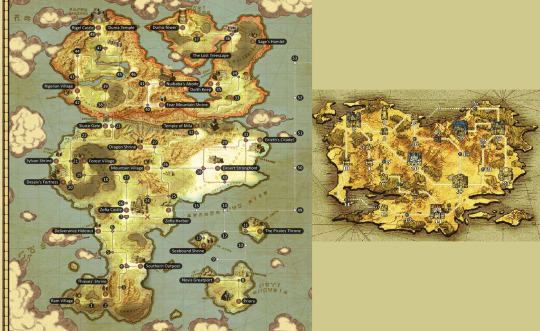
I’m not advocating that the two continents are particularly related in any way, but there are a good number of similarities that FE8 takes from even the world map of the older game.
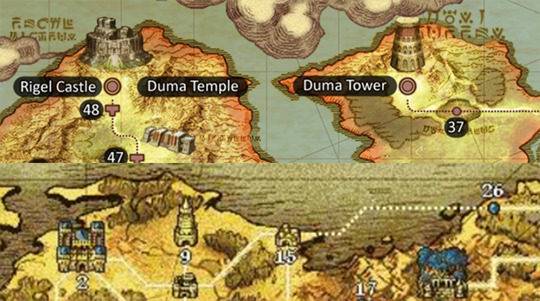
Starting with the northernmost parts of the two maps, Rigel Castle is in a very similar position to Frelia Castle (#2 on Magvel’s map). (While Frelia’s climate is never specified, at least in some other FE games, pegasi come from snowy, cold areas and Rigel is known for its snow and ice even if we don’t see any Pegasus Riders hail from that region in FE2.)
To the right of either castle is a tower in their countries’ territories. Although Duma Tower would be more where Melkaen Coast is on Magvel’s map (26 in the image), they both play an important role to the two countries; Duma Tower holds, unsurprisingly, Duma himself, while the Tower of Valni held Frelia’s Sacred Stone. They also make for some really good grinding opportunities.

To the far northeast of both world maps are the final areas of the game: On Celica’s side, she goes into the heavily-forested Lost Treescape, within which Sage’s Hamlet was established. In Magvel, the combined party travels to Rausten, which by the map is also a heavily-forested country. Both Sage’s Hamlet and Rausten Court are the residences of a religious leader as well (Halcyon/Hark is the deposed ruler of the Duma Faithful, while Mansel is the rightful leader but banished the heretic Riev, who in turn went to Grado and at least helped the return of the Demon King).
En route to that region, both Celica’s party and the FE8 party pass through areas with HP-penalty tiles. (Though in FE8, Thieves, Rogues, and Assassins are able to disable the lava tiles. Somehow. They have some real dexterous fingers.)
Furthermore, the final battles both occur to the region to the west of the final “safe zones” for Celica’s party and the FE8 party (Sage’s Hamlet and Rausten Court). Said regions are also the holding areas of the final boss, who are revived in time for the final battle.
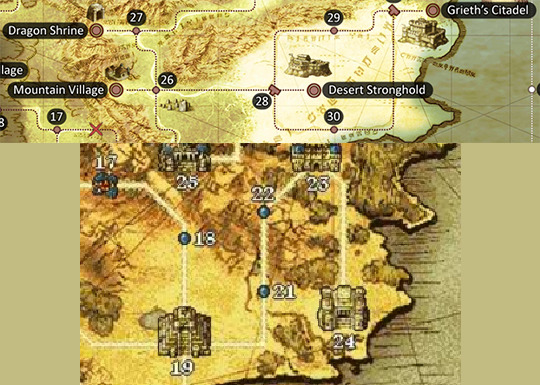
To the south of those two regions are deserts, also at the far eastern end of the two continents. Jehanna, like Grieth’s former territory after the war, is a country of mercenaries. To the east of both deserts (or northeast, for FE8) is a village, where a person who lives there joins your group to pass through the desert for their own purposes. In Gaiden/SoV, it’s Atlas, a villager who wants to defeat Grieth and bring his brothers back home. In FE8, it’s Saleh, a Sage who is in search of Myrrh and joins Eirika’s party so that they can reunite with Ephraim’s party, which Myrrh chose to travel alongside with.
(Caer Pelyn seems to be a composite of both the Mountain Village and the Forest Village on Alm’s route where Luthier and Delthea hail; geographically, it’s more like the Mountain Village, while the residents of Caer Pelyn seem more inclined to magic and have a legendary heroine in their history much like how Luthier and Delthea are descendants of a great female mage. Granted, the “descended from a great female mage” stuff seems to be new to SoV and wasn’t mentioned in Gaiden, so that specific example is shakier.)
While passing through Jehanna is mandatory, unlike the desert in Celica’s route, both of them technically have an optional location; at the ends of the deserts are Grieth’s Citadel and Lagdou Ruins. Celica can choose to ignore Grieth (and the whole desert) entirely at the expense of Atlas, the Whitewings, Jesse, and either Deen or Sonya. While Lagdou Ruins seems to be more of an offshoot of Rausten rather than Jehanna, it’s located in the desert area, east of Jehanna Hall (which could stand in for Valentia’s Desert Stronghold), and is entirely optional for the main campaign.
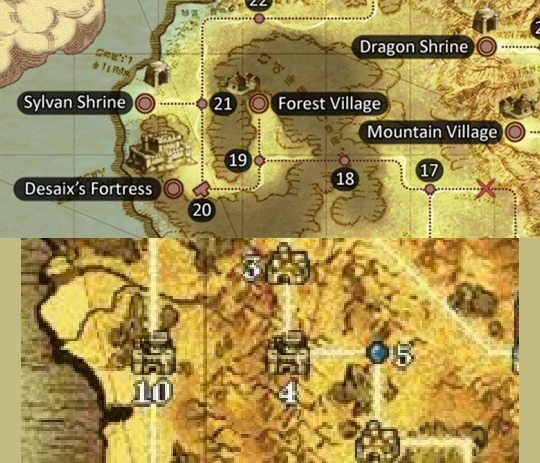
In the western middle section of both continents is a fortress that Alm and Ephraim’s parties assault before heading into the main body of the enemy country. They’re also both held by large-bodied men with equally large egos, Desaix and Gheb, who take an important noblewoman (Mathilda and Tana) as prisoners. (Said women also tend to turn out as war goddesses; although Mathilda lost her ponytail in her redesign, Gaiden Mathilda and Tana both have long flowing ponytails. Tana could also be seen as a composite character of Clair and Mathilda; having Clair’s class, a crush on the male Lord, and an older brother who is renowned throughout their continent, and a design similar to Mathilda. She also gets captured twice, while Clair and Mathilda were each captured once.)
To the east of the fortress is a village in the forest. Though I said that Caer Pelyn seems to be a composite of the Mountain Village and the Forest Village, Za’ha Woods (#5) is very definitely akin to the Forest Village, as you get two magic users (Lute and Artur) there, matching Luthier and Delthea. (It probably also isn’t coincidental that Artur and Lute’s growth specialties are similar to Luthier and Delthea’s; Artur and Luthier having more HP and Skill while Lute and Delthea have more Magic and Speed.)
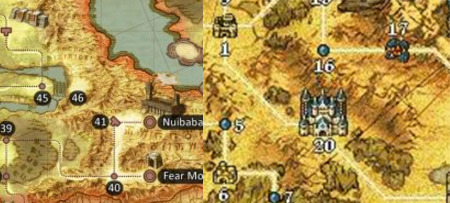
Closer to the center of either continent is a rather prominent mountain range. Between The Last Bastion of Valentia’s map (the area below Rigel Castle/Duma Temple) and the Fear Mountain Shrine is a mountain range that bears a small similarity to the mountain range between Frelia’s Border Mulan to the tip of Jehanna. Nuibaba’s Abode sits within that mountain range much like how Castle Renais sits at least close to it, though luckily we don’t need to deal with Medusa when we wrestle Castle Renais back from Orson.
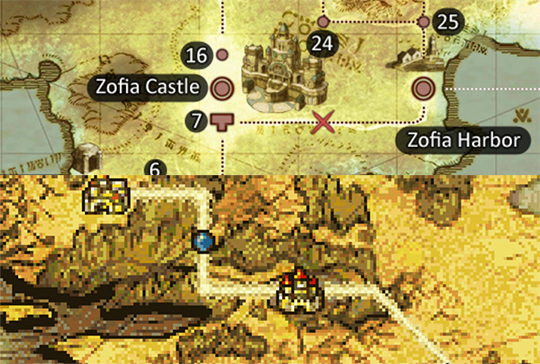
The first third of both stories (Acts 1+2 in Gaiden, Chapters 1-8 in FE8) end at a fortress that is pretty close to the ocean/a large body of water. Both are notably surrounded by a moat and boast an impressive defense that is broken through by your party. Plot-wise, it’s also where both Lords of their respective games meet up before they split up; Celica pays a visit after hearing of Alm’s victory over Desaix, while Eirika went under the impression of freeing Ephraim and Ephraim doubles back to keep her from falling into the trap.
Also good to point out is that this location gets to show off prominent mid-game villains. Desaix and Valter appear in Zofia Castle and Fort Renvall, respectively, but neither are fought there; both hatch plans to defeat/capture your party there, but while Desaix underestimates them and flees/leaves a body double to take the fall, Valter is implied to have purposely let Ephraim’s party go (and probably assumed that Tirado would fall to them too). Both will fall in the second third of the story, Desaix in Act 3 and Valter in Chapter 15.
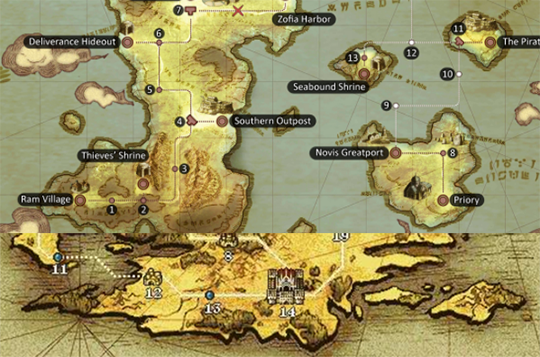
And last but not least, the southernmost part of the two continents. While the western sides bear almost no similarities, both have islands off the eastern coast. While the islands have no significance to FE8, what is also notable is that the game’s only boat chapter occurs in the western side, while Celica has several boat maps between Novis Greatport and Zofia Harbor.
(Also intriguing is that in Ephraim’s boat chapter, while Riev doesn’t stick around as a boss, he does summon monsters that Ephraim’s party must fight, much like how Celica’s party first encounters a Cantor on a boat who summons Terrors to fight them. Cantor Riev when?)
In conclusion: Magvel is actually just Valentia condensed, just as FE8 is the spiritual successor of FE2, if not just FE2 lite.
#Fire Emblem: Gaiden#Fire Emblem Echoes: Shadows of Valentia#Fire Emblem: The Sacred Stones#fe15#fe8#fe2#valentia#magvel#meta#admin: Zebra
73 notes
·
View notes